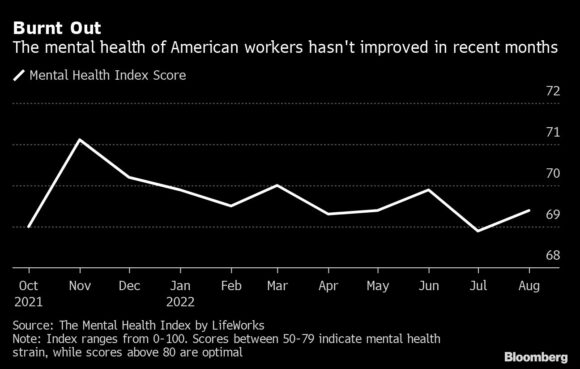A coalition of corporate, academic and nonprofit partners including Bank of America Corp. and insurer AXA SA has developed a tool that employers can use to measure and improve the mental health of their workers.
The assessment, known as the Mental Health at Work Index, will score the effectiveness of an organization’s mental-health programs and recommend enhancements. The goal is to “help define what good looks like,” said Christina McCarthy, executive director of One Mind at Work, the nonprofit that spearheaded the venture.
One Mind at Work, measurement company Ethisphere and experts at Columbia University have spent the past year designing the index, which they describe as a standardized assessment of programs and practices that support workforce wellbeing. AXA and close to 40 corporate partnersincluding Aon Plc and Prudential Financial Inc. will pilot-test the index, which has received $3 million in funding and supplants a simpler assessment One Mind previously used. The index should be available for any business to purchase early next year. The scorecard’s backers hope it can address levels of stress, anxiety and depression that soared during the pandemic, costing organizations 12 billion workdays a year, according to the World Health Organization.
“This costs a massive amount, and CEOs know this needs to be tackled,” Gordon Watson, AXA’s CEO of Asia and Africa, said in an interview. “But it’s like a slippery fish that we can’t get our hands around. You have meditation apps and apps to sleep better, but no real integrated approach. Are we doing well? We don’t know. How do we measure progress? How are we compared to our competitors? So we had the idea to make that visible and tangible.”

The index hopes to cut through the surfeit of surveys and services that have proliferated over the past three years as employees dealt with the ravages of COVID-19, racial-justice protests following George Floyd’s murder and remote work’s disruption of work-life balance. More than 75% of full-time US workers reported experiencing at least one symptom of a mental health condition last year, up from 59% in 2019, according to Mind Share Partners, a mental-health nonprofit. Workplace-focused startups like Lyra Health Inc., Spring Health and Ginger have emerged, and organizations have added a slew of wellbeing programs, perks and apps.
The problem, though, is that “most organizations are just throwing spaghetti against the wall to see what sticks,” said Kathy Pike, a psychology professor at Columbia and director of the Columbia-WHO Center for Global Mental Health. “There’s a plethora of commercial products for sale, but no guidance on what to do. You can’t decide what product to buy if you don’t know what problem to solve.”
One challenge: long-standing stigmas around seeking help for mental health limit the reach and effectiveness of workplace offerings. Despite the slew of new wellness products, the mental health of working Americans has barely budged since the pandemic hit, according to an index compiled by benefits administrator LifeWorks, now part of Telus Corp.
Organizations using One Mind’s new tool complete a 76-question self-evaluation, which delves into 10 areas including employment practices, communication, training and benefits. They receive a “maturity score” for each category from one (bad) to five (best), and an overall rating. Companies review their scores, get recommendations for improvements, and can request deeper evaluations of their programs from experts like Pike. As more companies take the assessment, industry-wide comparisons will be available, McCarthy said. One Mind’s 150 member organizations — which include Accenture, Delta Air Lines Inc. and Mastercard Inc. — will initially get free access to test out the scorecard, as will Ethisphere’s corporate members, such as Microsoft Corp. and Coca-Cola Co.
One Mind at Work representatives declined to disclose how much the index will cost once it’s widely available next year, but said the price will be based on whether businesses just do the self-evaluation, or seek additional assistance and resources.
Industry experts not involved in the index’s development said while it’s not perfect, it’s definitely a step forward. “You can have a lot of programs and processes and still miss the boat,” said Mike Thompson, chief executive officer of the National Alliance of Healthcare Purchaser Coalitions, which represents 12,000 employers. “The value of having a scoring mechanism is that it helps me find out what I am doing well and what could I do better. So this is good.”
Darcy Gruttadaro, chief innovation officer at the National Alliance on Mental Illness, said she’ s concerned that only big, well-heeled companies will use the tool, and that it might not drill down deep enough to understand what makes employees reluctant to seek help. Half of those who live with mental-health conditions are not in care, according to the National Institute of Mental Health.
Still, the idea of a scorecard should resonate with CEOs, according to AXA’s Watson, as “they get numbers, they get rankings.” Not engaging with employee mental health can also be costly.
Depression alone accounts for 200 million lost workdays annually, costing U.S. employers between $17 billion and $44 billion in lost productivity, according to the Centers for Disease Control and Prevention. Delaying treatment for a mental-health condition can also quadruple the annual cost of medical-health claims later on.
“It makes business sense to do this,” Watson said.
Was this article valuable?
Here are more articles you may enjoy.


 Sompo Receives Regulatory Approvals to Acquire Aspen Insurance in $3.5B Deal
Sompo Receives Regulatory Approvals to Acquire Aspen Insurance in $3.5B Deal  US Supreme Court Rejects Trump’s Global Tariffs
US Supreme Court Rejects Trump’s Global Tariffs  Zurich Insurance Profit Beats Estimates as CEO Eyes Beazley
Zurich Insurance Profit Beats Estimates as CEO Eyes Beazley  Palantir Decamps to Miami Co-Working Space in Surprise Move
Palantir Decamps to Miami Co-Working Space in Surprise Move 

